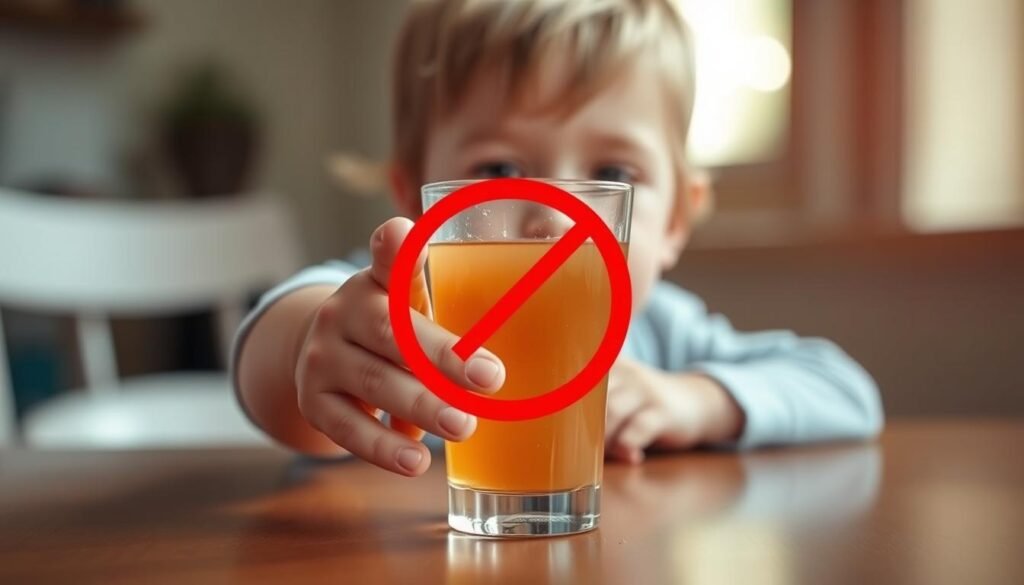Could a fizzy, fermented drink actually support your child’s well-being? Kombucha, a probiotic-rich beverage, has gained popularity among health-conscious parents. But is it safe and beneficial for younger ones?
Store-bought options contain minimal alcohol (under 0.5% ABV), making them generally safe for children. However, homemade brews may need dilution due to inconsistent fermentation. Always consult a pediatrician before adding it to their diet.
This drink offers potential perks like gut health support. Yet, moderation and proper serving sizes matter. Let’s explore how to introduce it safely while maximizing its advantages.
Key Takeaways
- Commercial kombucha has low alcohol levels, approved for children.
- Homemade versions may require dilution for safety.
- Probiotics in this drink could aid digestion.
- Always seek a doctor’s advice before serving.
- Small portions help avoid excess caffeine or sugar.
Is Kombucha Safe for Kids?
Parents often wonder if this tangy drink is a smart choice for young ones. The answer depends on the source. Store-bought kombucha safe options follow FDA guidelines, testing for contaminants and capping alcohol at 0.5% ABV. Homemade brews, however, can reach 3% ABV—closer to beer—and lack quality controls.
Commercial products halt fermentation through refrigeration, ensuring stability. Dr. Stephen Lauer warns that DIY batches risk harmful bacteria or mold if improperly handled. Always check labels for allergens like gluten or unexpected additives.
The CDC advises adults to limit intake to 12 oz daily—a helpful benchmark for serving sizes. For children, smaller portions reduce exposure to caffeine or excess sugar. When in doubt, consult a pediatrician to ensure it’s safe for kids.
Health Benefits of Kombucha for Kids
Fermented beverages like kombucha are praised for their probiotic content—but do children benefit? While research is limited, some components may support growing bodies. Always pair these health benefits kombucha claims with pediatrician guidance.
Probiotics and Gut Health
Dr. Barry Sears notes that live cultures in kombucha could aid digestion. These probiotics might balance gut bacteria, potentially boosting immunity. However, levels vary by brew, and yogurt often offers more consistent strains for young ones.
Vitamins and Antioxidants
This drink contains B-vitamins like folate and riboflavin, which support energy metabolism. Polyphenols act as antioxidants, though Dr. Paul Matz cautions that benefits for children lack rigorous study. It’s not a substitute for a vitamin-rich diet.
Organic acids in kombucha, like gluconic acid, may also play a role in mental health by influencing gut-brain signals. Yet, relying solely on this beverage for nutrition isn’t advised. Moderation is key.
Understanding the Alcohol Content in Kombucha
How much alcohol is actually in that bottle of kombucha? Commercial brands like Brew Dr. Kombucha use specialized processes to keep levels below 0.5% ABV—the legal limit for non-alcoholic drinks. Homemade batches, however, can surpass 3% ABV if fermented too long.
Alcohol content depends heavily on fermentation time. A 7-day brew may stay under 0.5%, while 30-day batches mimic beer. Store-bought options halt fermentation early through pasteurization or refrigeration.
Drinking multiple bottles adds up. Four servings of a 0.5% drink equal roughly one light beer’s alcohol. For home brewers, breathalyzer strips help test percent alcohol safely.
Always check labels for compliance with U.S. standards. When unsure, dilute homemade amounts or opt for trusted brands in single bottle sizes to control intake.
When Kombucha Isn’t Safe for Children
While kombucha offers benefits, certain situations make it unsuitable for young ones. Its acidic nature and fermentation process can pose risks for some children. Always prioritize safety by recognizing these red flags.
Allergies and Sensitivities
Fermented drinks may trigger reactions in sensitive individuals. Cross-contamination with allergens like dairy or eggs is possible in shared facilities. Children with diabetes should also avoid excess residual sugars.
Dr. Yana Nikolova warns that the acidic pH (around 3) erodes primary tooth enamel. Immunocompromised kids face higher risks from live cultures. Always check labels and consult a doctor first.
Over-Fermentation and Spoilage
An improper brewing process or extended fermentation time can create toxins. Spoiled batches may grow mold or harmful bacteria. Watch for excessive fizz, vinegar-like smells, or cloudy textures.
Two 1990s cases linked homemade brews to lactic acidosis. Discard any batch left unrefrigerated over 48 hours. When in doubt, toss it out—safety trumps waste.
Tips for Serving Kombucha to Kids
Small adjustments can make this probiotic drink child-friendly. Make sure to start with 2–4 oz servings for first-timers. This helps gauge tolerance and avoids overwhelming their palate.
Pair it with meals to neutralize acidity. The food buffers the drink’s tang while aiding digestion. For homemade batches, dilute 1:1 with water to reduce intensity.
Flavor tricks work wonders. Mix with apple juice or freeze into popsicles for a fun twist. Brew Dr. Kombucha contains under 15mg caffeine per bottle—less than decaf coffee—but serve it earlier in the day to prevent sleep disruptions.
Straws minimize tooth enamel contact. The answer to keeping it enjoyable? Balance and moderation. These steps ensure it’s safe children can enjoy responsibly.
Managing Kombucha in a Household with Kids
Keeping fermented drinks in a home with young ones requires smart storage strategies. Secure brewing vessels in high cabinets or locked pantries to prevent spills or accidental tasting. Opaque containers reduce visual appeal, deterring curious sips.
Labeling is critical. Mark ferments with dates and alcohol warnings, especially for home brews. The NYT reported a 2019 incident where a child mistook a fizzy bottle for a soccer ball—highlighting the need for clear storage rules.
Branded starter kits, like Nourishme Organics’ Soda Stream Instant Kombucha Kit, offer consistency. These limit variables in the culture process, making batches safer for households. Always supervise when adults enjoy these drinks around children.
Education helps too. Many parents report that a first sour sip naturally limits overconsumption. Store ferments out of reach, and reserve kombucha one for designated times to build healthy habits.
Conclusion
While kombucha offers potential health benefits, it should remain an occasional drink rather than a daily staple for children. The CDC and AAP emphasize water as the best hydration choice, with fermented options like this as supplementary.
For safety, stick to store-bought brands with controlled alcohol levels. Small portions—around 2–4 oz—help avoid excess sugar or caffeine. Use this beverage as a fun way to teach about probiotics and fermentation science.
Always consult a pediatrician before introducing new drinks. For more guidance, refer to the American Academy of Pediatrics’ beverage recommendations. Balance and moderation ensure the best approach for growing bodies.
FAQ
Can children drink kombucha safely?
Yes, in moderation. Most store-bought varieties contain trace alcohol levels (below 0.5% ABV), similar to ripe fruit. Always check labels and opt for reputable brands.
What health benefits does kombucha offer young ones?
It supports digestion with live probiotics and provides B vitamins. Antioxidants from tea may also boost immunity, but consult a pediatrician first.
How much kombucha is safe for a child?
Start with small amounts—2-4 oz per day—and monitor reactions. Avoid daily consumption to prevent excess acidity or caffeine intake.
Are there risks if kids drink too much?
Overconsumption may cause stomach upset due to acidity or mild caffeine effects. Spoiled or homebrewed batches with higher alcohol content should be avoided.
What’s the best way to introduce this drink?
Dilute it with water or serve chilled in tiny portions. Choose flavors like ginger or berry, which are often kid-friendly.
Should I avoid giving kombucha to children with certain conditions?
Yes. Kids with weakened immune systems, diabetes, or allergies to tea/caffeine should steer clear. Homemade brews pose higher risks.







